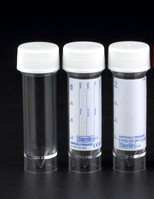
Oxalate (Oxalic acid) is an organic acid that is a natural end product of metabolism. Exogenous (dietary) sources of oxalate include rhubarb, spinach, nuts and chocolate; ascorbic acid (Vitamin C) is a precursor of oxalate and excessive vitamin C intake can result in increased oxalate excretion. Endogenous synthesis of oxalate occurs in the liver and enzyme deficiencies in this metabolic pathway give rise to the rare inherited disorders Primary Hyperoxaluria (PH) type 1, 2 and 3. Urinary oxalate excretion is markedly elevated in patients with PH. Secondary causes of raised oxalate excretion include high dietary intake of oxalate / oxalate precursors and fat malabsorption (which increases intestinal absorption of oxalate via complex formation between oxalate and free fatty acids). Approximately 90% of oxalate is excreted via the kidneys; when urine oxalate concentration is increased there is increased formation of insoluble calcium oxalate, giving rise to kidney stones.
Tube
25 mL universal containing 1mL 4M HCl (preferred) or plain universal container. Contact lab for special container.
ID
29978
Availability
Weekdays. Assay is run fortnightly.
Additional Information
Oxalate is derived from dietary oxalic acid, ascorbic acid and glycine metabolism.
Turn Around
20 days.
Send to
Specialist Laboratory Medicine,
Block 46,
St James’s University Hospital,
Beckett Street,
Leeds
LS9 7TF
Contact
For further details please contact Leeds Pathology customer services: [email protected].
Collection Con
Collect a fresh random urine into a plain container and transfer immediately to a 25 mL universal containing 1 mL 4M HCl. Alternatively send the plain sample to the laboratory to be acidified on receipt in the laboratory. Samples MUST be received in the lab on the day of collection.
Sample REQ
Random acidified urine sample. Instructions for Lab: Transfer plain urine samples immediately upon receipt to a 25 mL universal containing 1 mL 4M HCl.
Units
mmol/mmol creatinine